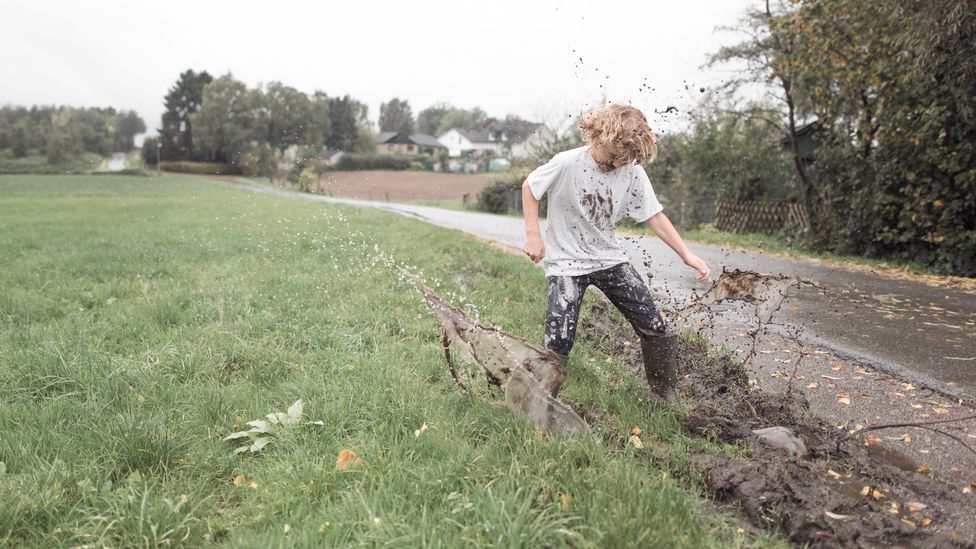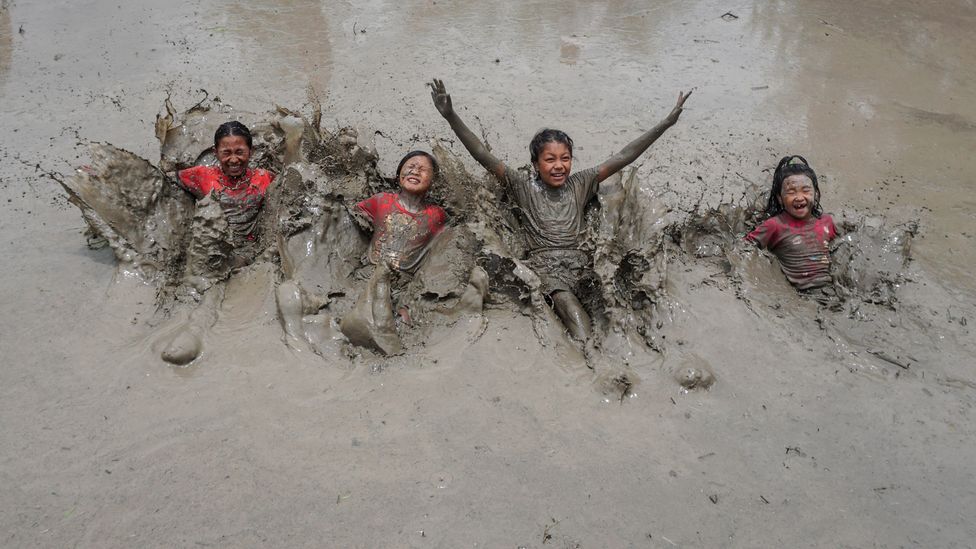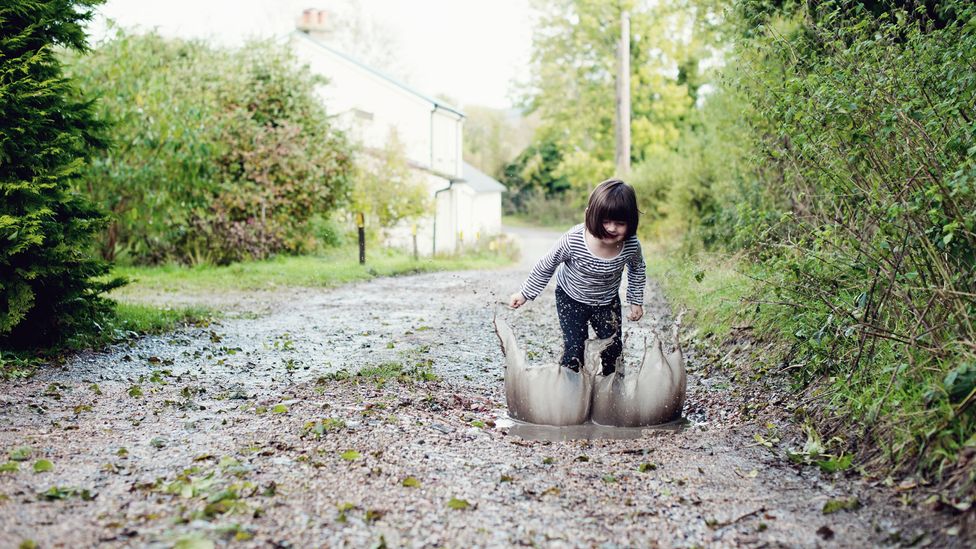Children love getting dirty. They are drawn to puddles like muddy magnets, with no regard for footwear or the colour of their clothing. But getting mucky could have a powerful effect on their wellbeing, too.
"Don't get dirty!" was once a constant family refrain, as parents despairingly watched their children spoil their best clothes. Whether they were running through farmers' fields, climbing trees or catching tadpoles, it was inevitable that children's whites would turn brown before the day was over.
Today, many parents may secretly wish their children had the chance to pick up a bit of grime. With the rise of urbanism, and the allure of video games and social media, contact with nature is much rarer than in the past. For many, there is simply no opportunity to get muddy.
What is gained in laundry bills may be lost in the child's wellbeing. According to recent research, the dirt outside is teaming with friendly microorganisms that can train the immune system and build resilience to a range of illnesses, including allergies, asthma and even depression and anxiety.
These findings show that outdoor exercise is not only beneficial because of the chance to roam free – but that certain natural materials, such as soil and mud, also contain surprisingly powerful microorganisms whose positive impact on children's health we are only beginning to fully understand.
Mental restoration
Many of the psychological benefits of outdoor play are already well established. Our brains evolved in natural landscapes, and our perceptual systems are particularly well suited to wild outdoor spaces.
This means that natural scenes provide the perfect level of stimulation, which is thought to help recharge the brain when it is tired and easily distractable. Supporting this theory, one study from 2009 found that children with attention-deficit hyperactivity disorder (ADHD) were better able to concentrate following a 20-minute walk in the park, compared to a 20-minute walk on the streets of a well-kept urban area. Being in the proximity to grass and trees seemed to have had a beneficial effect on their minds. The authors recommended using such "doses of nature" as a safe and accessible way of supporting children with ADHD, alongside other tools.
Besides these restorative effects, outdoor play can offer valuable learning experiences. For example, the act of moulding and kneading materials like mud or sand can help children develop the way their senses and movement interact, known as sensorimotor development, according to Francesco Vitrano, a child neuropsychiatrist, psychotherapist and lecturer at the University of Palermo, Italy, who has a long experience of applying these therapies. This allows the child to gradually understand his or her bodily signals.
Such activities – away from the house or classroom – may also help children to find ways to cope with emotions that may be hard to explore in other environments. So-called "sand tray therapy", which involves using sand and miniature figurines to express one's thoughts and feelings, is an accepted form of counselling for children who are struggling to verbalise their emotional state.
When it comes to the child's physical health, the most obvious advantage of outdoor play may be the exercise. A child may find it easier to build up strength and stamina in a large open space resulting in a reduced risk of obesity, according to one study led by Elizabeth Gershoff, professor of human development and family sciences at the University of Texas at Austin, US.
The latest findings, however, suggest there could be a host of other advantages to playing in natural environments – and the secret may be alive and wriggling around in the mud itself.

Growing up in the countryside has been found to have long-term health benefits (Credit: Getty Images)
Old friends
The new research offers a fresh take on the "hygiene hypothesis", first postulated in the late 1980s. According to this idea, the great reduction in childhood infections over the 20th Century had an undesirable side effect on people's immune systems, leading them to become overreactive to the slightest stimulation. The result was thought to be the rise in asthma, hay fever and food allergies.
Many scientists now dislike the term hygiene hypothesis, however, since it seemed to discourage important behaviours like hand-washing. And they balk at the idea that infections, per se, are beneficial for children. "It was quite problematic from a public health perspective," says Christopher Lowry, a professor of integrative physiology and the director of the behavioural neuroendocrinology laboratory at the University of Colorado, Boulder, US.
Instead, it is the non-infectious organisms that are now thought to be key – rather than the ones that actually make our children sick. These "old friends" have been around for much of our evolutionary history. They are mostly harmless, and train the immune system to moderate its activity, rather than overreacting to any potential invader.
Importantly, our bodies meet these old friends whenever we spend time in nature. With increased urbanisation, and reduced outdoor play, many children now lack that exposure – meaning that their immune systems are more sensitive to any threat, and more likely to go into overdrive.
Friendly microbes in the gut can improve our health, and they may also act through our skin
Various studies support this idea. People who grow up on farms are generally less likely to develop asthma, allergies, or auto-immune disorders like Crohn's disease – thanks, apparently, to their childhood exposure to a more diverse range of organisms in the rural environment that had encouraged more effective regulation of the immune system.
Much of the healthy stimulation, afforded by these bugs, is thought to come through the digestive system – it is now well known that friendly microbes in the gut can improve our health in multiple ways. But they may also act on and through our skin, according to Michele Antonelli, a doctor from Reggio Emilia, Italy, who has researched the ways that mud therapies can influence health.
The outer layer of our body hosts many species of microbes, he says, and people with disorders such as atopic dermatitis (a common form of eczema) and psoriasis seem to be have an impoverished community of organisms. The microbial diversity even seems to be linked conditions like arthritis. "These microorganisms can play a major role in many major chronic diseases," he says.

A group of children enjoy a mud bath on Nepal's National Paddy Day, which marks the start of the rice planting season (Credit: Getty Images)
Healthy body, healthy mind
Most surprisingly, friendly bugs from nature can even moderate the body's response to stress.
When we feel vulnerable and threatened, the immune system starts raising bodily inflammation. Since inflammation is one of the first defences against infection, this response evolved as a way of preparing the body for a potential physical injury from the threat we were facing – but it's less useful for the kinds of stresses most people face today.
Remarkably, people who spent the majority of their childhoods in a rural setting tend to show a more muted response to stressful events like public speaking, with the reduced expression of inflammatory molecules like interleukin 6, compared with those who had grown up in cities. This remained true even when the scientists controlled for other factors – such as their socio-economic status.
That could have serious consequence for long-term health, since chronic bodily inflammation can contribute to a range of conditions. It appears to increase the risk of depression, for example. "The people who grew up in cities are kind of 'walking time bombs', in terms of their inflammation," says Lowry, who was a co-author on the paper.
'Dramatic effects'
As results supporting the "old friends hypothesis" continue to role in, some researchers have started to identify the specific organisms that may be responsible these benefits, and the ways they bring about those changes.
Lowry is particularly interested in Mycobacterium vaccae, which can often be found in soil. When mice have been exposed to M. vaccae, they show enhanced activity of regulatory T cells – which, as the name suggests, help to rein in immune activity, including inflammatory responses. This then seems to render them more resilient to stressful events, such as a potential confrontation with another, more aggressive mouse. "We see very dramatic effects on stress resilience, even a month after the last injection," says Lowry.
Of course, mice are not the same as human children, but it does offer some clues about the role certain microorganisms may play.
Some scientists have also expressed considerable excitement about the role of "helminths" – soil-dwelling parasites such as roundworm – largely due to the moderated immune response they trigger in their hosts. People who have been infected with helminths seem to have a lower risk of inflammatory bowel diseases such as Crohn's disease. Some trials have attempted to deliberately expose patients to the larvae of these parasites, with mixed successes. These therapies would have to contend with the potential undesirable side-effects of having worms, however. That's not to mention the obvious "yuck factor" that is likely to discourage many people from deliberately ingesting a helminth.
More appealingly, Antonelli suggests that many spa therapies – including mud baths and thermal mineral water baths – may improve our health by introducing beneficial organisms to the skin's microbial communities. Many species may be responsible for the benefits, including Staphylococcus epidermidis, which has been shown to have anti-inflammatory effects.

Making time for outdoor play can have surprising benefits, research shows (Credit: Getty Images)
Forest transplants
Given the importance of early exposure to friendly bacteria, many scientists are investigating the benefits of interventions that encourage greater contact with nature in childhood. Antonelli says that the act of "forest bathing" – gentle meditative walks through the woods – has been shown to improve the symptoms of children and teenagers with atopic dermatitis, for example. By touching the leaves and the soil, they may have picked up friendly organisms that enriched their skin microbiomes, he says.
An ambitious project in Finland, meanwhile, attempted to bring nature to the children. In four day-care centres, the researchers replaced the asphalt and gravel of the schoolyard with "transplanted" soil and vegetation taken from a boreal forest floor. They were also given planting boxes for gardening. "That encouraged further contact," says Aki Sinkkonen at the University of Helsinki, a co-author of the paper who specialises in the mud microbiome.
One month later, the children showed signs of heightened microbial diversity on their skin and in their gut, as well as improved immune function. They had greater numbers of those regulatory T cells that help to moderate the body's reactions to harmless invaders, for example. The proportion of anti-inflammatory molecules in the blood plasma also increased – which again indicates a better regulated immune system.
In the future, Sinkkonen hopes to test the long-term effects of these changes. "I think that they should lead to lower incidence of human disease – that's our hypothesis."
Mud kitchens
Given the known psychological benefits, many day-care centres and schools are already encouraging greater contact with nature – with outdoor lessons, regular nature walks and the construction of mud kitchens that encourage children to play in the dirt.
"In many nurseries and school, there is a growing awareness that children have fewer open spaces to play," says Marilisa Modena, an architect who specialises in the designs of schools, and founder of Zeroseiplanet, an Italian research and training centre focusing on the benefits of outdoor play. "And we're looking for ways to re-introduce those activities that, until around 50 years ago, were common experiences for children." The greater interest in outdoor play began in Northern Europe, Modena says, but it is now spreading to many other countries.
With future research, it may be possible to enrich the soil in house gardens and schoolyards with the most beneficial organisms. For now, parents and teachers may have to work with what they have. Mud kitchens, in particular, can be cost effective and take up little space. All you need is an old table and some pots of pans recycled from the kitchen, and filled with a mixture of soil and water. More sophisticated structures could be equipped with cupboards and drawers filled with stones, rocks, sand and vegetation.
As the little mud chefs dirty themselves with their new imaginative creations, they may be cultivating their minds and optimising their immune systems, with potential benefits for months or even years to come.
BBC





